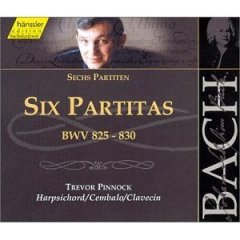Bach - The Six Partitas BWV 825-830 (Trevor Pinnock)
Bach - The Six Partitas BWV 825-830 (1999)

CD1
1. Partita for keyboard No. 1 in B flat major, BWV 825 (BC L1): Praeludium
2. Partita for keyboard No. 1 in B flat major, BWV 825 (BC L1): Allemande
3. Partita for keyboard No. 1 in B flat major, BWV 825 (BC L1): Courante
4. Partita for keyboard No. 1 in B flat major, BWV 825 (BC L1): Sarabande
5. Partita for keyboard No. 1 in B flat major, BWV 825 (BC L1): Menuet I / Menuet II
6. Partita for keyboard No. 1 in B flat major, BWV 825 (BC L1): Gigue
7. Partita for keyboard No. 2 in C minor, BWV 826 (BC L2): Sinfonia. Grave Adagio... Andante
8. Partita for keyboard No. 2 in C minor, BWV 826 (BC L2): Allemande
9. Partita for keyboard No. 2 in C minor, BWV 826 (BC L2): Courante
10. Partita for keyboard No. 2 in C minor, BWV 826 (BC L2): Sarabande
11. Partita for keyboard No. 2 in C minor, BWV 826 (BC L2): Rondeau
12. Partita for keyboard No. 2 in C minor, BWV 826 (BC L2): Capriccio
13. Partita for keyboard No. 6 in E minor, BWV 830 (BC L6): Toccata
14. Partita for keyboard No. 6 in E minor, BWV 830 (BC L6): Allemande
15. Partita for keyboard No. 6 in E minor, BWV 830 (BC L6): Courante
16. Partita for keyboard No. 6 in E minor, BWV 830 (BC L6): Air
17. Partita for keyboard No. 6 in E minor, BWV 830 (BC L6): Sarabande
18. Partita for keyboard No. 6 in E minor, BWV 830 (BC L6): Tempo di Gavotta
19. Partita for keyboard No. 6 in E minor, BWV 830 (BC L6): Gigue
CD2
1. Partita for keyboard No. 3 in A minor, BWV 827 (BC L3): Fantasia
2. Partita for keyboard No. 3 in A minor, BWV 827 (BC L3): Allemande
3. Partita for keyboard No. 3 in A minor, BWV 827 (BC L3): Courante
4. Partita for keyboard No. 3 in A minor, BWV 827 (BC L3): Sarabande
5. Partita for keyboard No. 3 in A minor, BWV 827 (BC L3): Burlesca
6. Partita for keyboard No. 3 in A minor, BWV 827 (BC L3): Scherza
7. Partita for keyboard No. 3 in A minor, BWV 827 (BC L3): Gigue
8. Partita for keyboard No. 4 in D major, BWV 828 (BC L4): Overture
9. Partita for keyboard No. 4 in D major, BWV 828 (BC L4): Allemande
10. Partita for keyboard No. 4 in D major, BWV 828 (BC L4): Courante
11. Partita for keyboard No. 4 in D major, BWV 828 (BC L4): Aria
12. Partita for keyboard No. 4 in D major, BWV 828 (BC L4): Sarabande
13. Partita for keyboard No. 4 in D major, BWV 828 (BC L4): Menuet
14. Partita for keyboard No. 4 in D major, BWV 828 (BC L4): Gigue
15. Partita for keyboard No. 5 in G major, BWV 829 (BC L5): Praeambulum
16. Partita for keyboard No. 5 in G major, BWV 829 (BC L5): Allemande
17. Partita for keyboard No. 5 in G major, BWV 829 (BC L5): Courante
18. Partita for keyboard No. 5 in G major, BWV 829 (BC L5): Sarabande
19. Partita for keyboard No. 5 in G major, BWV 829 (BC L5): Tempo di Minuetto
20. Partita for keyboard No. 5 in G major, BWV 829 (BC L5): Passepied
21. Partita for keyboard No. 5 in G major, BWV 829 (BC L5): Gigue
Performer: Trevor Pinnock - harpsichord
Bach wrote his keyboard partitas when his career as a church musician had gone wrong. They became the foundation for a massive composite work in which he explored every aspect of the 18th-century precursor to the piano. But how--and on what--should they be played today? The jury is out, and will stay out forever. That's why it's such a pleasure to compare approaches, and why there's no such thing as a "best buy." Go back to 1952, courtesy of the Music and Arts label, and listen to Ralph Kirkpatrick's graceful recordings: as the granddaddy of all modern Bach players, he's still got a lot to offer. Then check out Richard Goode's superb piano version to see how the big modern instrument can, in expert hands, still replicate the earlier instrument's understated charms. And now listen to Trevor Pinnock, rapidly emerging as our premier harpsichordist, whose new version of the partitas must be one of the most compelling ever made. Nobody gets such a luxurious range of color from the instrument or extracts such full-blooded drama. His tempi are on the fast side, and they whirl along when Bach hints that the brakes can be taken off. Here is real virtuosity in the noblest of causes. --Michael Church
So many artists today play these works on piano that it is refreshing to have a version with harpsichord. Pinnock plays a modern copy of a period harpsichord, and its sound is invariably natural and pleasing. The sound engineering is rich and perhaps a little too resonant in places, but this sound is faithful to what you might have heard in a nobleman's high ceilinged hall. As for the performances, they are simply luscious. Pinnock has all the technical command necessary for the big moments, but his playing also is flexible and nuanced where required. His big career as a period instruments conductor has perhaps robbed us of having a marvelous harpsichordist before the public full time. I am not permanently shelving my piano recordings of these works by Glenn Gould and Maria Tipo, both wonderful, but Pinnock's is a healthy and refreshing take on these works. ---David Saemann
download: uploaded anonfiles mega 4shared mixturecloud yandex
Zmieniony (Środa, 07 Sierpień 2013 12:46)








